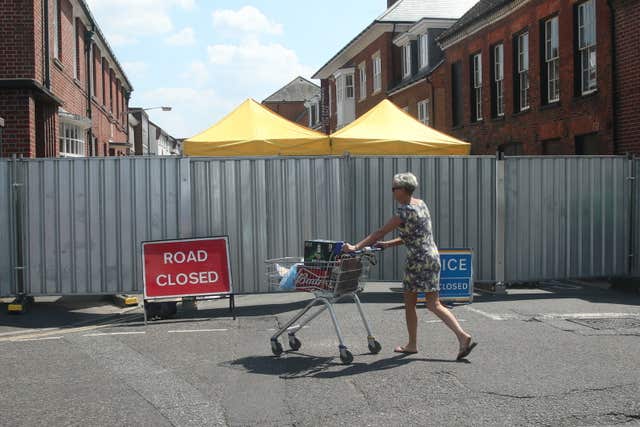
International experts have finished their initial work collecting samples linked to the Novichok poisonings.
A team from the Organisation for the Prohibition of Chemical Weapons (OPCW) was called in to independently verify that the nerve agent had fatally poisoned Dawn Sturgess and left her partner Charlie Rowley seriously ill.
The samples gathered will now be analysed at two OPCW labs before the results are reported back to the UK.
Specialist police officers are carrying out a detailed search of a park at the centre of the poisoning investigation with a view to reopening the area to the public.
Queen Elizabeth Gardens and other locations in Salisbury and nearby Amesbury were cordoned off last month after Mr Rowley, 45, and Ms Sturgess, 44, were exposed to the nerve agent.
Ms Sturgess, a mother-of-three, died in hospital a week after falling ill. An inquest into her death is due to open and adjourn on Thursday.
As part of the ongoing investigation, Wiltshire Police and Counter Terrorism Policing specialist search trained officers will today commence a structured search of Queen Elizabeth Gardens in #Salisbury. Read more: https://t.co/CgLPDRxX2e pic.twitter.com/xqVqNgUMX7
— Salisbury Police (@SouthWiltsCPT) July 18, 2018
Experts are trying to determine whether the Novichok that poisoned the couple was from the same batch used in the attempted murder of former double agent Sergei Skripal and his daughter Yulia in March.
Last week counter-terrorism detectives revealed they had found a small bottle containing Novichok at Mr Rowley’s home in Muggleton Road, Amesbury.
They are trying to establish where the container – reportedly a bottle of perfume – came from, and how it came to be in Mr Rowley’s home.

Officers have warned that the searches of properties in Salisbury and Amesbury could last months after recovering 400 exhibits, samples and items.
Wiltshire Police said the search of Queen Elizabeth Gardens was taking place to assist the wider investigation and with a view to safely returning the gardens to public use.
Parts of the park will be fingertip searched and others will have more general searching.
Officers will carefully check the grounds and remove key items of waste and litter as part of the search.
If you have concerns or information about the ongoing incident in #Amesbury please call one of our dedicated phone numbers. Freephone: 0800 092 0410, or 020 7158 0124 if you cannot dial Freephone numbers or if calling from abroad. pic.twitter.com/zHXMfMRb5d
— Wiltshire Police (@wiltshirepolice) July 6, 2018
Deputy Chief Constable Paul Mills said: “The commencement of the searching of the gardens is a significant step in the operation and our key priority is to return the gardens to the public at the earliest opportunity.
“We are intentionally undertaking a detailed and meticulous search so that the public can return to using the gardens with confidence when they are reopened.
“I would like to thank the public for their continued support and understanding whilst the gardens have been closed.
“We remain very aware of both the levels of concern and inconvenience the cordons are causing.
“We remain committed to ensuring the ongoing safety of the public both during and after the investigation.
“At this time it is anticipated that the search activity will take a number of days and we will provide a full update on the work undertaken in due course.”
Mike Wade, Public Health England deputy director for health protection in the South West, said: “The risk to the public remains low.
“As a precaution Public Health England continues to strongly advise the public not to pick up any strange items such as syringes, needles, cosmetics or similar objects made of materials such as metal, plastic or glass.
“The advice remains – if you didn’t drop it, then don’t pick it up.”


Comments: Our rules
We want our comments to be a lively and valuable part of our community - a place where readers can debate and engage with the most important local issues. The ability to comment on our stories is a privilege, not a right, however, and that privilege may be withdrawn if it is abused or misused.
Please report any comments that break our rules.
Read the rules hereComments are closed on this article